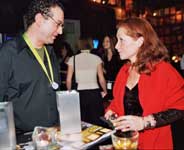Berkeleyan
UC joins effort for access to scholarship
![]()
| 08 April 2004
| |  Each year, Wired magazine presents its Rave Awards in 14 categories, ranging from music and film direction to science, business, and software. At its 2004 awards ceremony at San Francisco’s Fillmore Auditorium, Berkeley researcher Michael Eisen and the Public Library of Science (which he co-founded), were honored. Three PLoS founders — Eisen, Harold Varmus, and Patrick Brown — were named in the science category for “cracking the spine of the science cartel” with their open-access scientific and medical publishing venture. An expert in computational and evolutionary biology, Eisen (above, in conversation with a well-wisher at the awards ceremony) is an adjunct assistant professor of molecular and cell biology and a researcher at Lawrence Berkeley National Laboratory. He and PloS colleagues shared the stage with other Rave winners, including Lord of the Rings director Peter Jackson, artist David Byrne, and Steve Jobs, founder and CEO of Apple and Pixar. Noah Berger photo |
The University of California libraries announced last week that UC has become an institutional member of the Public Library of Science.
With a mission to make scientific and medical literature a public resource, the Public Library of Science (PLoS) is a non-profit organization of scientists and physicians committed to making the world’s scientific and medical literature a freely available public resource. It was founded in 2000 by Nobel laureate, former National Institutes of Health director, and UC San Francisco faculty member Harold E. Varmus and colleagues.
On their website devoted to reshaping scholarly communication, the libraries of UC’s 10 campuses noted that comprehensive access to the expanding volume of scholarly materials necessary for research and teaching is at risk for UC as it is for higher education generally (see libraries.universityofcalifornia.edu/scholarly/). Traditional scholarly publishing models — especially commercial publisher business models — have limited the ability to maintain, much less increase the breadth and depth of library collections, because they are unsustainable for library budgets.
“The decision to join PLoS — clearly one of the leaders in the international movement to create unfettered access to scientific and medical literature — was taken jointly by all of UC’s campus libraries,” said Beverlee French, director for shared digital collections at UC. “It reflects our unanimous resolve to address the unsustainable economics of current scholarly publishing by directing some of our scarce dollars away from overpriced journals and toward innovation.”
Daniel Greenstein, UC associate vice provost for scholarly information, added, “It seems clear that a range of strategies is needed to evolve scholarly communication systems so that they continue to support scholarship and the academy. In addition to the important gesture of early support and membership in PLoS, we have joined and supported other efforts, such as BioMed Central and the Association of Research Libraries’ Scholarly Publishing and Academic Resources Coalition.
“The UC libraries also have their own alternative publications and open-access repositories. They form part of a robust scholarly communication program, which which includes publishing initiatives, research, policy, and faculty outreach.”
Helen J. Doyle, PLoS director of development and strategic alliances, said that UC’s support for open-access publishing is “an important statement of its commitment to share the products of scientific research with the citizens who fund it,” adding that it’s her hope that “the libraries’ effort to maximize the impact of the studies that UC researchers conduct will serve as a model for other public and private universities and institutions.”

